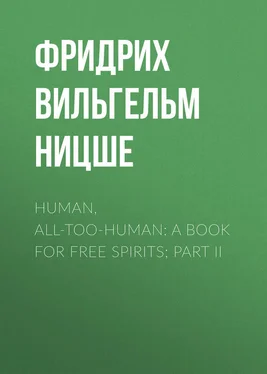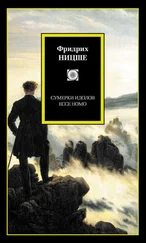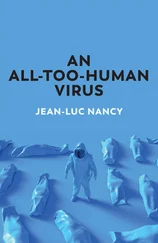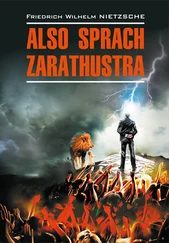Фридрих Ницше - Human, All-Too-Human - A Book For Free Spirits; Part II
Здесь есть возможность читать онлайн «Фридрих Ницше - Human, All-Too-Human - A Book For Free Spirits; Part II» — ознакомительный отрывок электронной книги совершенно бесплатно, а после прочтения отрывка купить полную версию. В некоторых случаях можно слушать аудио, скачать через торрент в формате fb2 и присутствует краткое содержание. Жанр: Философия, literature_19, foreign_antique, foreign_prose, на английском языке. Описание произведения, (предисловие) а так же отзывы посетителей доступны на портале библиотеки ЛибКат.
- Название:Human, All-Too-Human: A Book For Free Spirits; Part II
- Автор:
- Жанр:
- Год:неизвестен
- ISBN:нет данных
- Рейтинг книги:3 / 5. Голосов: 1
-
Избранное:Добавить в избранное
- Отзывы:
-
Ваша оценка:
- 60
- 1
- 2
- 3
- 4
- 5
Human, All-Too-Human: A Book For Free Spirits; Part II: краткое содержание, описание и аннотация
Предлагаем к чтению аннотацию, описание, краткое содержание или предисловие (зависит от того, что написал сам автор книги «Human, All-Too-Human: A Book For Free Spirits; Part II»). Если вы не нашли необходимую информацию о книге — напишите в комментариях, мы постараемся отыскать её.
Human, All-Too-Human: A Book For Free Spirits; Part II — читать онлайн ознакомительный отрывок
Ниже представлен текст книги, разбитый по страницам. Система сохранения места последней прочитанной страницы, позволяет с удобством читать онлайн бесплатно книгу «Human, All-Too-Human: A Book For Free Spirits; Part II», без необходимости каждый раз заново искать на чём Вы остановились. Поставьте закладку, и сможете в любой момент перейти на страницу, на которой закончили чтение.
Интервал:
Закладка:
Debauchery. – Not joy but joylessness is the mother of debauchery.
Reward and Punishment. – No one accuses without an underlying notion of punishment and revenge, even when he accuses his fate or himself. All complaint is accusation, all self-congratulation is praise. Whether we do one or the other, we always make some one responsible.
Doubly Unjust. – We sometimes advance truth by a twofold injustice: when we see and represent consecutively the two sides of a case which we are not in a position to see together, but in such a way that every time we mistake or deny the other side, fancying that what we see is the whole truth.
Mistrust. – Self-mistrust does not always proceed uncertainly and shyly, but sometimes in a furious rage, having worked itself into a frenzy in order not to tremble.
Philosophy of Parvenus. – If you want to be a personality you must even hold your shadow in honour.
Knowing how to Wash Oneself Clean. – We must know how to emerge cleaner from unclean conditions, and, if necessary, how to wash ourselves even with dirty water.
Letting Yourself Go. – The more you let yourself go, the less others let you go.
The Innocent Rogue. – There is a slow, gradual path to vice and rascality of every description. In the end, the traveller is quite abandoned by the insect-swarms of a bad conscience, and although a thorough scoundrel he walks in innocence.
Making Plans. – Making plans and conceiving projects involves many agreeable sentiments. He that had the strength to be nothing but a contriver of plans all his life would be a happy man. But one must occasionally have a rest from this activity by carrying a plan into execution, and then comes anger and sobriety.
Wherewith We See the Ideal. – Every efficient man is blocked by his efficiency and cannot look out freely from its prison. Had he not also a goodly share of imperfection, he could, by reason of his virtue, never arrive at an intellectual or moral freedom. Our shortcomings are the eyes with which we see the ideal.
Dishonest Praise. – Dishonest praise causes many more twinges of conscience than dishonest blame, probably only because we have exposed our capacity for judgment far more completely through excessive praise than through excessive and unjust blame.
How One Dies is Indifferent. – The whole way in which a man thinks of death during the prime of his life and strength is very expressive and significant for what we call his character. But the hour of death itself, his behaviour on the death-bed, is almost indifferent. The exhaustion of waning life, especially when old people die, the irregular or insufficient nourishment of the brain during this last period, the occasionally violent pain, the novel and untried nature of the whole position, and only too often the ebb and flow of superstitious impressions and fears, as if dying were of much consequence and meant the crossing of bridges of the most terrible kind – all this forbids our using death as a testimony concerning the living. Nor is it true that the dying man is generally more honest than the living. On the contrary, through the solemn attitude of the bystanders, the repressed or flowing streams of tears and emotions, every one is inveigled into a comedy of vanity, now conscious, now unconscious. The serious way in which every dying man is treated must have been to many a poor despised devil the highest joy of his whole life and a sort of compensation and repayment for many privations.
Morality and its Sacrifice. – The origin of morality may be traced to two ideas: “The community is of more value than the individual,” and “The permanent interest is to be preferred to the temporary.” The conclusion drawn is that the permanent interest of the community is unconditionally to be set above the temporary interest of the individual, especially his momentary well-being, but also his permanent interest and even the prolongation of his existence. Even if the individual suffers by an arrangement that suits the mass, even if he is depressed and ruined by it, morality must be maintained and the victim brought to the sacrifice. Such a trend of thought arises, however, only in those who are not the victims – for in the victim's case it enforces the claim that the individual might be worth more than the many, and that the present enjoyment, the “moment in paradise,” 7should perhaps be rated higher than a tame succession of untroubled or comfortable circumstances. But the philosophy of the sacrificial victim always finds voice too late, and so victory remains with morals and morality: which are really nothing more than the sentiment for the whole concept of morals under which one lives and has been reared – and reared not as an individual but as a member of the whole, as a cipher in a majority. Hence it constantly happens that the individual makes himself into a majority by means of his morality.
The Good and the Good Conscience. – You hold that all good things have at all times had a good conscience? Science, which is certainly a very good thing, has come into the world without such a conscience and quite free from all pathos, rather clandestinely, by roundabout ways, walking with shrouded or masked face like a sinner, and always with the feeling at least of being a smuggler. Good conscience has bad conscience for its stepping-stone, not for its opposite. For all that is good has at one time been new and consequently strange, against morals, immoral, and has gnawed like a worm at the heart of the fortunate discoverer.
Success Sanctifies the Intentions. – We should not shrink from treading the road to a virtue, even when we see clearly that nothing but egotism, and accordingly utility, personal comfort, fear, considerations of health, reputation, or glory, are the impelling motives. These motives are styled ignoble and selfish. Very well, but if they stimulate us to some virtue – for example, self-denial, dutifulness, order, thrift, measure, and moderation – let us listen to them, whatever their epithets may be! For if we reach the goal to which they summon us, then the virtue we have attained, by means of the pure air it makes us breathe and the spiritual well-being it communicates, ennobles the remoter impulses of our action, and afterwards we no longer perform those actions from the same coarse motives that inspired us before. – Education should therefore force the virtues on the pupil, as far as possible, according to his disposition. Then virtue, the sunshine and summer atmosphere of the soul, can contribute her own share of work and add mellowness and sweetness.
Dabblers in Christianity, not Christians. – So that is your Christianity! – To annoy humanity you praise “God and His Saints,” and again when you want to praise humanity you go so far that God and His Saints must be annoyed. – I wish you would at least learn Christian manners, as you are so deficient in the civility of the Christian heart.
The Religious and Irreligious Impression of Nature. – A true believer must be to us an object of veneration, but the same holds good of a true, sincere, convinced unbeliever. With men of the latter stamp we are near to the high mountains where mighty rivers have their source, and with believers we are under vigorous, shady, restful trees.
Judicial Murder. – The two greatest judicial murders 8in the world's history are, to speak without exaggeration, concealed and well-concealed suicide. In both cases a man willed to die, and in both cases he let his breast be pierced by the sword in the hand of human injustice.
Читать дальшеИнтервал:
Закладка:
Похожие книги на «Human, All-Too-Human: A Book For Free Spirits; Part II»
Представляем Вашему вниманию похожие книги на «Human, All-Too-Human: A Book For Free Spirits; Part II» списком для выбора. Мы отобрали схожую по названию и смыслу литературу в надежде предоставить читателям больше вариантов отыскать новые, интересные, ещё непрочитанные произведения.
Обсуждение, отзывы о книге «Human, All-Too-Human: A Book For Free Spirits; Part II» и просто собственные мнения читателей. Оставьте ваши комментарии, напишите, что Вы думаете о произведении, его смысле или главных героях. Укажите что конкретно понравилось, а что нет, и почему Вы так считаете.












